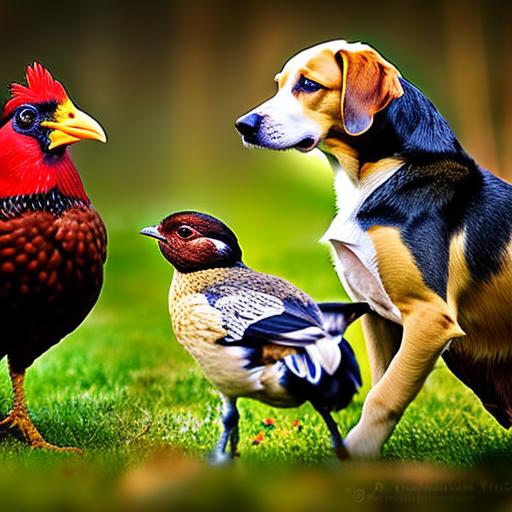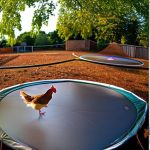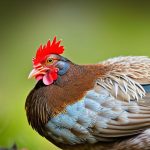Keeping dogs and chickens together can be a rewarding and fulfilling experience for pet owners. Not only do dogs provide companionship and protection, but chickens can also offer natural pest control and a source of entertainment. However, it is important to carefully consider the advantages and disadvantages of coexisting these two animals before making the decision to bring them together.
Personally, I have had the experience of keeping dogs and chickens together on my property. It has been a learning process, but with proper training and management, I have been able to create a peaceful and harmonious environment for both animals. In this article, I will share my insights and provide tips on how to successfully keep dogs and chickens together.
Key Takeaways
- Keeping dogs and chickens together is possible, but requires careful planning and management.
- Advantages of coexisting dogs and chickens include pest control and companionship, while disadvantages include potential for injury or death to chickens.
- Factors to consider before keeping dogs and chickens together include breed and temperament of both animals, as well as the size and layout of the property.
- Training your dog to live with chickens involves teaching basic obedience and gradually introducing them to the chickens while supervised.
- Preparing a safe and secure environment for chickens and dogs involves providing separate areas for each animal and ensuring that fencing and enclosures are secure.
- Managing food and water for dogs and chickens involves providing separate feeding stations and ensuring that chickens have access to clean water.
- Preventing dog attacks on chickens involves supervising interactions and training dogs to leave chickens alone.
- Addressing health concerns for dogs and chickens involves regular veterinary care and ensuring that chickens have access to clean living conditions.
- Tips for maintaining a peaceful relationship between dogs and chickens include providing plenty of exercise and mental stimulation for dogs, and ensuring that chickens have plenty of space and access to dust baths.
- In conclusion, it is possible to keep dogs and chickens together, but it requires careful planning, management, and ongoing supervision.
Advantages and Disadvantages of Coexisting Dogs and Chickens
There are several advantages to keeping dogs and chickens together. One of the main benefits is natural pest control. Chickens are excellent at foraging for insects, ticks, and other pests in the yard. They can help keep your property free from unwanted critters, reducing the need for chemical pesticides.
Another advantage is companionship. Dogs are social animals and having chickens around can provide them with additional company. They can form bonds with the chickens and enjoy spending time together. Additionally, chickens can be quite entertaining to watch, providing both you and your dog with amusement.
However, there are also disadvantages to consider. One major concern is the potential for dog attacks on chickens. Some dog breeds have a strong prey drive and may see chickens as prey animals. This can lead to injuries or even death for the chickens. It is important to carefully assess your dog’s breed and temperament before introducing them to chickens.
Another disadvantage is the stress that chickens may experience when living with dogs. Dogs are predators by nature, and their presence can cause anxiety for chickens. This stress can affect their egg production and overall health. Additionally, dogs may be tempted to chase or harass the chickens, which can further increase their stress levels.
Lastly, there are health concerns to consider. Dogs and chickens can both carry diseases and parasites that can be transmitted to each other. Regular veterinary check-ups, proper vaccination, and parasite prevention are essential to ensure the health and well-being of both animals.
Factors to Consider Before Keeping Dogs and Chickens Together
Before bringing dogs and chickens together, there are several factors that need to be considered. First and foremost, the breed and temperament of your dog should be carefully assessed. Some breeds, such as hunting or herding breeds, may have a higher prey drive and may not be suitable for living with chickens. It is important to choose a dog that is known to have a calm and gentle temperament.
Similarly, the breed and personality of your chickens should also be taken into account. Some chicken breeds are more flighty or easily stressed than others. It is important to choose breeds that are known to be calm and adaptable.
The size of your yard or coop is another important factor to consider. Dogs need space to run and play, so it is important to ensure that there is enough room for both dogs and chickens to coexist comfortably. If you have a small yard or coop, it may be more challenging to keep dogs and chickens together.
Lastly, the time commitment for training and maintenance should not be overlooked. Dogs require regular exercise, training, and attention. Chickens also require daily care, including feeding, watering, and cleaning their coop. It is important to assess whether you have the time and resources to properly care for both animals.
Training Your Dog to Live with Chickens
Proper training is crucial when introducing dogs to chickens. Basic obedience training is essential for all dogs, regardless of whether they will be living with chickens or not. Commands such as “sit,” “stay,” and “leave it” are particularly important when it comes to managing interactions between dogs and chickens.
Desensitization is another important aspect of training. Gradually exposing your dog to chickens in a controlled and supervised environment can help them become accustomed to their presence. Start by keeping your dog on a leash and allowing them to observe the chickens from a distance. Reward calm and relaxed behavior with treats and praise.
Positive reinforcement techniques should be used throughout the training process. Rewarding your dog for good behavior will help them associate positive experiences with the presence of chickens. This can help reduce any potential prey drive or aggression towards the chickens.
Preparing a Safe and Secure Environment for Chickens and Dogs
Creating a safe and secure environment is essential when keeping dogs and chickens together. Proper fencing and enclosures are crucial to prevent dogs from gaining access to the chicken coop or yard. Ensure that the fencing is secure and tall enough to prevent dogs from jumping over or digging under.
During unsupervised times, it is important to separate dogs and chickens to prevent any potential accidents or attacks. This can be done by providing separate areas for each animal, such as a separate fenced-off section of the yard or a separate coop for the chickens.
Providing adequate shelter and nesting boxes for the chickens is also important. Chickens need a safe and comfortable space to roost and lay their eggs. Ensure that their coop is well-ventilated, predator-proof, and provides enough space for all the chickens.
Managing Food and Water for Dogs and Chickens

Separate feeding areas should be provided for dogs and chickens. Dogs have different nutritional needs than chickens, so it is important to feed them appropriate diets. Feeding dogs separately can also help prevent any potential food aggression or competition between the two animals.
Fresh water should be provided for both dogs and chickens at all times. Ensure that water sources are easily accessible and clean. Regularly check and refill water bowls to ensure that both animals have access to fresh water.
Preventing Dog Attacks on Chickens
Supervision is key when it comes to preventing dog attacks on chickens. Dogs should never be left alone with chickens, especially if they have not been properly trained or are known to have a high prey drive. Always keep an eye on their interactions and be ready to intervene if necessary.
Using deterrents can also help prevent dog attacks. Noise or motion-activated devices can startle dogs and discourage them from approaching the chickens. This can be particularly useful if you are unable to supervise their interactions at all times.
Training dogs to leave chickens alone is another important step in preventing attacks. Consistent training and reinforcement of commands such as “leave it” or “stay” can help establish boundaries and teach dogs to respect the presence of chickens.
Addressing Health Concerns for Dogs and Chickens
Regular veterinary check-ups are important for both dogs and chickens. Dogs should receive regular vaccinations and parasite prevention treatments to ensure their health and prevent the transmission of diseases to the chickens. Similarly, chickens should receive appropriate vaccinations and parasite control measures.
Monitoring for signs of illness or injury is crucial for both animals. Dogs should be regularly checked for any signs of aggression or predatory behavior towards the chickens. Chickens should be observed for any signs of stress, illness, or injury, such as decreased egg production, lethargy, or abnormal behavior.
Tips for Maintaining a Peaceful Relationship Between Dogs and Chickens
Consistency is key when it comes to maintaining a peaceful relationship between dogs and chickens. Continue training and reinforcing positive behaviors on a regular basis. This will help establish boundaries and ensure that both animals understand what is expected of them.
Providing plenty of exercise and mental stimulation for dogs is also important. A tired dog is less likely to exhibit predatory behavior towards the chickens. Regular walks, playtime, and training sessions can help keep dogs mentally and physically stimulated.
Ensuring that chickens have enough space and resources is crucial for their well-being. Overcrowding can lead to stress and aggression among the chickens. Provide enough space for them to roam, dust bathe, and forage. Additionally, ensure that there are enough nesting boxes and perches for all the chickens.
Is It Possible to Keep Dogs and Chickens Together?
In conclusion, it is possible to keep dogs and chickens together with proper training, management, and precautions. While there are advantages to coexisting these two animals, such as natural pest control and companionship, there are also disadvantages to consider, such as the potential for dog attacks and chicken stress.
Before bringing dogs and chickens together, it is important to carefully assess the breed and temperament of your dog, as well as the breed and personality of your chickens. The size of your yard or coop, as well as the time commitment for training and maintenance, should also be considered.
Training your dog to live with chickens, creating a safe environment, managing food and water, preventing dog attacks, and addressing health concerns are all important steps in maintaining a peaceful relationship between dogs and chickens.
With proper care and attention, dogs and chickens can coexist harmoniously, providing both you and your pets with a rewarding and fulfilling experience.
If you’re considering keeping dogs and chickens together, it’s important to understand the dynamics and requirements of both animals. While it may seem like a challenging task, with proper planning and precautions, it can be done successfully. One crucial aspect is providing a secure and suitable coop for your chickens. In an informative article on Poultry Wizard, you can learn about the importance of a well-designed chicken coop and nest box, which not only ensures the safety of your feathered friends but also helps maintain their health and productivity. To further explore this topic, check out the article on chicken coop and nest box ideas for valuable insights and practical tips.
FAQs
Can dogs and chickens live together?
Yes, dogs and chickens can live together peacefully if they are properly trained and supervised.
What breeds of dogs are best suited to live with chickens?
Breeds that have a low prey drive, such as retrievers, spaniels, and herding breeds, are generally better suited to live with chickens.
How can I train my dog to live with chickens?
Training your dog to live with chickens involves teaching them basic obedience commands, such as “leave it” and “stay,” and gradually introducing them to the chickens while on a leash.
What precautions should I take when introducing my dog to chickens?
When introducing your dog to chickens, it is important to keep them on a leash and supervise them at all times. You should also make sure that the chickens have a safe and secure area to retreat to if they feel threatened.
What are some signs that my dog may not be suited to live with chickens?
Signs that your dog may not be suited to live with chickens include a high prey drive, excessive barking or chasing behavior, and a lack of obedience training.
What steps can I take to ensure the safety of my chickens around my dog?
To ensure the safety of your chickens around your dog, you should provide them with a secure coop and run area, supervise them when they are outside, and train your dog to leave the chickens alone. You may also want to consider using a shock collar or other deterrent to discourage your dog from chasing or attacking the chickens.
Meet Walter, the feathered-friend fanatic of Florida! Nestled in the sunshine state, Walter struts through life with his feathered companions, clucking his way to happiness. With a coop that’s fancier than a five-star hotel, he’s the Don Juan of the chicken world. When he’s not teaching his hens to do the cha-cha, you’ll find him in a heated debate with his prized rooster, Sir Clucks-a-Lot. Walter’s poultry passion is no yolk; he’s the sunny-side-up guy you never knew you needed in your flock of friends!







